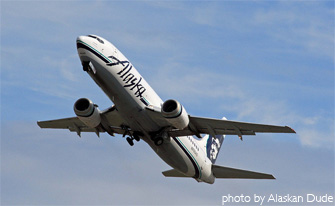Student thesis explores accounting methods for airline frequent flyer programs
by Kathleen McCoy |
Many people living in Alaska are members of a frequent flyer program for one airline or another (raise your hand if its Alaska Airlines!*). So when you find yourself sitting at the computer trying to book an award ticket, do you ever wonder how your airline can afford to give you a seat for free?

Recent accounting graduate Brian Franklin took on this topic as his senior undergraduate research thesis for the University Honors College. Specifically, he examined the two existing methods of frequent flyer program accounting under which "the obligation to provide free or reduced-fare travel to passengers who redeem their accrued frequent flyer program benefits" is added to airlines' liabilities on the balance sheet, and then eventually to their bottom line when passengers redeem miles.
The Deferred Revenue Method recognizes redeemed frequent flyer miles at their fair value, or "the amount for which the award credits could be sold separately."
The Incremental Cost Method only applies the marginal cost of redeemed miles to airlines' liabilities line, costs that include taxes, fuel, and food to fly a reward passenger on a seat that would have otherwise flown empty.
Fairly technical for the average traveler, these two accounting methods each have their own pros and cons for those actually managing frequent flyer programs. As Franklin notes in his final paper, "Specific management incentives are associated with the adoption and use of each account method, and the...method chosen by a given airline can potentially drive the way management operates its frequent flyer program."
For airlines, one method over the other can manifest itself as increased liabilities on the books (airlines using the Deferred Revenue Method report a frequent flyer liability that is sometimes twice that of their Incremental Cost Method counterparts). But what's at stake for the traveler?
- Carefully controlled programs that try to ensure passengers redeeming awards are filling only seats that otherwise would have been empty
- Thresholds of mileage credits an airline might require for an award to be issued
- Expiration of earned credits
- Ratio of award seats to full-price seats available on a given flight
- Passenger loyalty
Believe it or not, how an airline is able to absorb the liability that is mileage credit can affect all of these things, which in turn trickle down to you, the passenger wanting to cash in on what you've earned.
Franklin reports that five of the seven major U.S. airlines in existence as of April 2012 use the Incremental Cost Method (Alaska, American, JetBlue, Southwest and U.S. Airways), while the remaining two, United and Delta, use the Deferred Revenue Method. (It is interesting to note, too, that United and Delta switched to the Deferred Revenue Method from the Incremental Cost Method after Chapter 11 reorganization. And Franklin does a great job of explaining why.)
Even though Franklin's report is more about how comparable airlines are to investors given that their accounting methods vary, it is still an interesting read from the perspective of having unused miles sitting in your frequent flyer account. To get into the nitty gritty, download his final report here (PDF). And read a full profile on Brian Franklin here.
*Fun fact: Alaska Airlines is the only U.S. legacy carrier never to have entered Chapter 11 bankruptcy. Franklin defines a legacy carrier as "an airline that was in existence and had established an interstate route network prior to industry deregulation in 1978 (as compared to a so-called low-cost carrier); of the seven major U.S. airlines as of April 2012, five were legacy airlines (Alaska, American, Delta Air Lines, United, and US Airways) and two were low-cost carriers (JetBlue Airways and Southwest)."
 "Student thesis explores accounting methods for airline frequent flyer programs" is licensed under a Creative Commons Attribution-NonCommercial 4.0 International License.
"Student thesis explores accounting methods for airline frequent flyer programs" is licensed under a Creative Commons Attribution-NonCommercial 4.0 International License.









